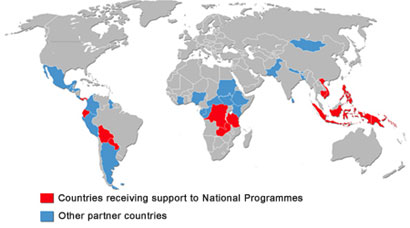The UN-REDD Programme is the United Nations Collaborative initiative on Reducing Emissions from Deforestation and forest Degradation (REDD) in developing countries.

The Programme was launched in September 2008 to assist developing countries prepare and implement national REDD+ strategies, and builds on the convening power and expertise of the Food and Agriculture Organization of the United Nations (FAO), the United Nations Development Programme (UNDP) and the United Nations Environment Programme (UNEP). Support to Countries
The Programme currently has 35 partner countries spanning Africa, Asia-Pacific and Latin America, of which 13 are receiving support to National Programme activities. These 13 countries are: Bolivia, Cambodia, Democratic Republic of the Congo (DRC), Ecuador, Indonesia, Panama, Papua New Guinea, Paraguay, the Philippines, Solomon Islands, Tanzania, Viet Nam and Zambia. To-date, the UN-REDD Programme’s Policy Board has approved a total of US$55.4 million for its nine initial pilot countries and four new countries (Cambodia, Ecuador, the Philippines and Solomon Islands). These funds help to support the development and implementation of national REDD+ strategies. National Programmes in seven UN-REDD Programme countries are now in their implementation phase (Bolivia, DRC, Indonesia, Panama, Tanzania, Viet Nam and Zambia). UN-REDD Programme countries not receiving direct support to national programmes engage with the Programme in a number of ways, including as observers to the Programme's Policy Board, and through participation in regional workshops and knowledge sharing, facilitated by the Programme’s interactive online workspace. These countries are: Argentina, Bangladesh, Bhutan, Central African Republic, Colombia, Costa Rica, Ethiopia, Gabon, Guatemala, Guyana, Honduras, Ivory Coast, Kenya, Mexico, Mongolia, Nepal, Nigeria, Pakistan, Peru, Republic of Congo, Sri Lanka and Sudan.
The UN-REDD Programme brings together technical teams from around the world to help develop analyses and guidelines on issues such as measurement, reporting and verification (MRV) of carbon emissions and flows, ensuring that forests continue to provide multiple benefits for livelihoods and the environment, and supporting the engagement of Indigenous Peoples and Civil Society at all stages of the design and implementation of REDD+ strategies. The UN-REDD Programme also seeks to build consensus and knowledge about REDD+, to ensure a REDD+ mechanism is included in a post-2012 climate change agreement.
MOST POPULAR IN LAST 24 HRS
MOST POPULAR IN LAST 7 DAYS
|